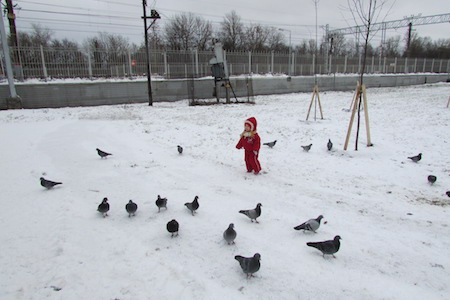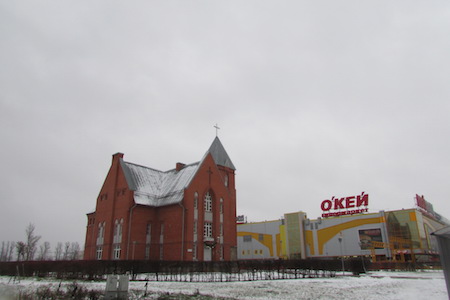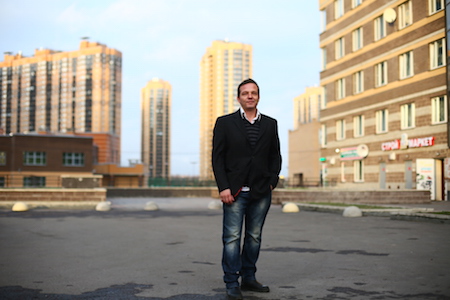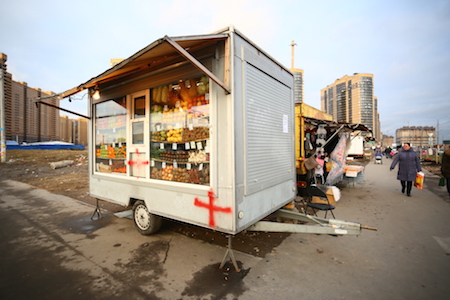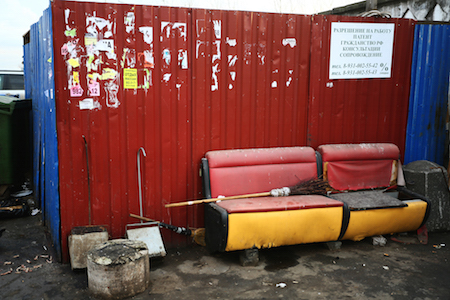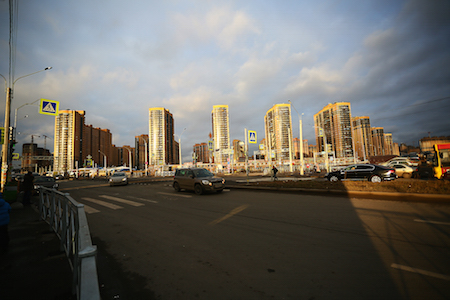Who or what is easier to fall in love with — the Russian people or the Russian winter? Amy Kulishova, South Africa, and Stratos Siourdakis, Greece, followed their Russian partners to the suburbs of St. Petersburg. They explain how they dealt with the cold, and why they prefer the suburbs and how they celebrate the winter holidays.
This special edition of PaperPaper.ru’s “Expats” section is written by students in the Global Communication and International Journalism Maters’s program at St. Petersburg State University Darina Gribova, Richard Ensor, Lina Rusch.
Read the Russian version of the issue
Amy Kulishova left South Africa for Russia with her husband Roman over two years ago. She was pregnant with their first daughter, Lily, at the time and they wanted to find a place to build a family in peace. Roman, originally from Kaliningrad, found a job in Kolpino. They looked into moving into the city, but quickly abandoned the idea.
— We just like the family atmosphere out here, — Amy says. — The city is lovely and beautiful, but it seems less friendly.
Amy has lovely colleagues at the English language school where she teaches three times per week. She tries to speak more Russian now, making it easier to integrate herself in with the neighbours.
— I miss being with other foreigners sometimes. Foreigners understand how you feel.
Kolpino may be remote, but Amy feels safe here.
— In South Africa you are always afraid, living in gated communities. Here I’m not scared at all. Not nervous being alone, not always looking over my shoulder. I can walk home from school by myself. Here we have nice neighbours, so your heart doesn’t skip a beat when the door bell rings.
With the political situation worsening, Amy’s family abroad worries about her and her husband because of what they hear about Russia in their media. Her sister living in the UK was worried that the stores were empty.
— I took a picture of the fresh produce section, — says Amy. — Serbian grapes, South African citrus, bananas from Ecuador — we’re fine.
Her family is also worried the borders might one day be closed, like in the Cold War.
— It hasn’t come to that yet.
Stratos Siourdakis, a 40 year-old Greek language teacher and former owner of a building company, has been living in Parnas for three months.
— It’s a totally new view for my Greek eyes, like a small Manhattan, — Stratos says. — In Greece we don’t have these kind of buildings, with lots of storeys; being a part of this huge complex, you understand how small you are. I’m feeling like an ant.
Having first visited Saint Petersburg as a tourist in 2008, Stratos met his future wife Tatiana. They have spent years together in Athens and Stratos has managed to escape the clutches of Russian winter until now. Three months ago, they moved to Parnas with their two year-old child.
— It’s nice to see people working on the vast construction projects, — reckons Stratos, which is not what one sees now in Greece, a country he describes as a “sinking boat”.
Stratos says there was one moment when he wished to live in the centre, not the outskirts: when he met an old friend from Greece downtown and ended up leaving the last bar at 4 AM.
— If I was twenty years old, like a student or something, I think the centre is a better idea. You know, you can crawl home after the bar.
He thinks centre is perfect for walking a lot, but it’s noisy and the houses are mostly very old.
Despite commuting several days a week from Parnas to Chernyshevskaya where his Greek school is located, Stratos doesn’t seem bothered by the 40 minute journey from Parnas station to his workplace. What bothers him at the moment is the winter weather.
— Very often, even when I walk the 10 minutes from my house to the metro, I imagine I’m in the army, in the special forces. Somethings awakens inside me and telling myself: “Don’t worry! You’re in the special forces! Don’t worry!”
Photos by Lina Rusch
Photos by Maria Ivanova
Coming to Russia has changed winter for Amy.
— I must admit, it’s my favourite season now, — she says. — South African winters are rainy and windy, but here there is snow. Winter here is a magical time for family and friends and it encourages you to believe in fairy tales.
The only thing Amy doesn’t like about Russian winter is all the clothes you have to wear. The couple left their South African wardrobe behind — the clothes simply weren’t warm enough.
Amy and Roman discovered early on that Christmas was celebrated very differently in their cultures.
— Neither of us wanted to lose our cultures, so we celebrate both. We have a lot of fun.
Christmas in South Africa is celebrated in the Anglo-saxon tradition on 25th December, during the summertime with traditional lunch of cold meats and salads. Amy eats the same Christmas feast here in Kolpino, but she can’t take the weather with her.
— The swimming pool is missing! But Christmas here still feels right.
— In Russian there is a word: “prochladno”, for “cool”, — says Stratos. — In Greek, it’s “δροσερός” — in our language it means that when it’s hot and you feel the wind, it’s a cool relief. When I’m told “it’s cool” here, it’s -1ºc and I think: what are you talking about? — laughs Stratos.
For him, there are two kinds of Russia: green and white, cold and very cold.
— The nature gives us a present in summer, and takes it away in the winter: we had white nights, now — black days.
Walking in the nearby parks with his child is one of Stratos’ favourite pastimes in Parnas, and he is eager to try skating on the lake when it freezes.
— The people fishing in the lakes here are incredible, I cannot imagine how people make a hole in ice and stay there for few hours! — he says. — And the street salesmen, they are heroes to me. Personally, I don’t have a passion for this temperature. When the temperature is right for me, there is no ice around.
Stratos says Russia is a tough country with severe people: “compared to Russians, Greeks are like girls”.

